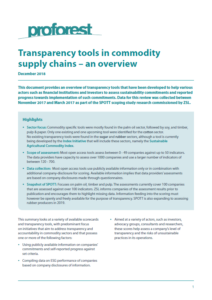From consumers concerned about sustainable ingredients and ethical banking, to financiers screening investment portfolios against a range of environmental, social and governance (ESG) issues, there is growing interest in responsible commodity production.
With transparency a crucial component of sustainable supply chains, tools to score, compare and track the progress of commodity companies’ sustainability commitments and implementation have proliferated – but how do these tools compare?
ZSL commissioned Proforest to review the transparency tools available to financial institutions, investors, advocacy groups and researchers for assessing company transparency. This report summarises 22 tools which focus on cross-cutting issues such as deforestation and human rights, as well as specific commodities including palm oil, soy, timber and pulp, and cotton.
Tools fell into two broad categories – open access and data provision – and varied widely in the number of companies assessed, the number of indicators companies are assessed against, how frequently assessments are updated, and the type of company data used. Sector-specific tools are most common for palm oil and soy, with fewer tools, and tools in development, for sectors such as sugar, rubber and cotton.
Niki Mardas, Executive Director, Global Canopy, said: “If companies are to deliver on their 2020 targets for removing deforestation from soft commodity supply chains, and if financial institutions are going to be able to support these goals, they both need access to expertise and information to support their decision-making. The findings of this report suggest that NGOs can help here by aligning and integrating their assessments more closely, making it easier to understand and use crucial information about how companies manage ESG risks and opportunities.”
In light of the scarcity of tools focusing on rubber production, and the growing sustainability challenges in the sector, SPOTT will begin assessing natural rubber producers in 2019.

